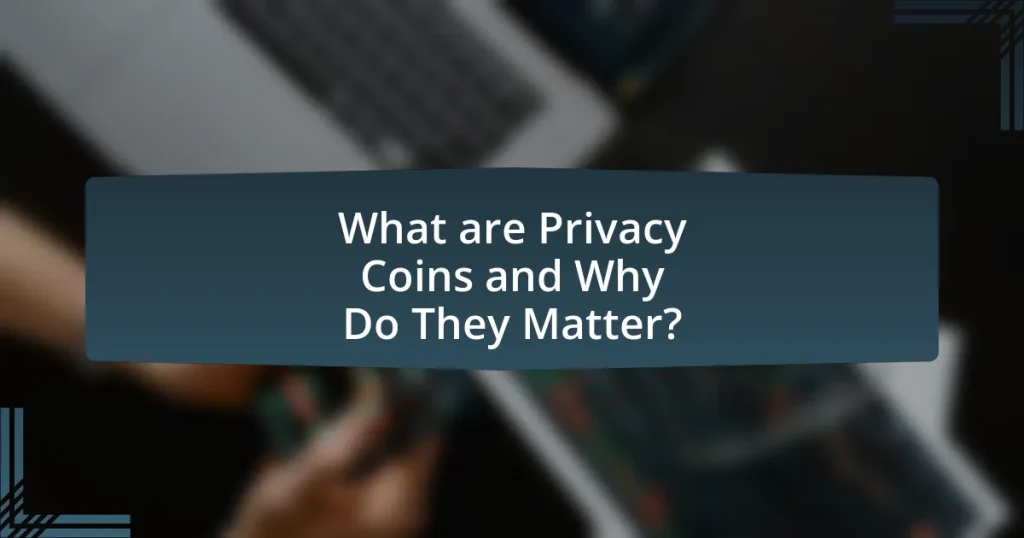Privacy coins are specialized cryptocurrencies that prioritize user anonymity and transaction confidentiality, addressing concerns over surveillance and data privacy in financial transactions. This article explores the evolution of privacy coins, highlighting key technologies such as ring signatures, stealth addresses, and zero-knowledge proofs that enhance anonymity. It examines the differences between privacy coins and traditional cryptocurrencies, the historical milestones in their development, and the challenges they face today, including regulatory scrutiny and technological vulnerabilities. Additionally, the article discusses best practices for users to maintain privacy and security while utilizing these digital assets.

What are Privacy Coins and Why Do They Matter?
Privacy coins are cryptocurrencies designed to provide enhanced anonymity and privacy for users by obscuring transaction details. They matter because they address growing concerns over surveillance and data privacy in financial transactions, allowing users to transact without revealing their identities or transaction histories. For instance, coins like Monero and Zcash utilize advanced cryptographic techniques such as ring signatures and zero-knowledge proofs to ensure that transaction amounts, sender, and receiver identities remain confidential. This capability is increasingly relevant in a digital landscape where personal data is often exploited, making privacy coins a critical tool for individuals seeking financial privacy and security.
How do Privacy Coins differ from traditional cryptocurrencies?
Privacy coins differ from traditional cryptocurrencies primarily in their focus on enhancing user anonymity and transaction privacy. While traditional cryptocurrencies like Bitcoin and Ethereum are pseudonymous, meaning that transaction details are visible on a public ledger, privacy coins such as Monero and Zcash utilize advanced cryptographic techniques to obscure transaction information, making it nearly impossible to trace the sender, receiver, or transaction amount. For instance, Monero employs ring signatures and stealth addresses to ensure that transactions cannot be linked to specific users, thereby providing a higher level of privacy compared to traditional cryptocurrencies, which can be analyzed and tracked on their respective blockchains.
What features contribute to the anonymity of Privacy Coins?
Privacy coins achieve anonymity through several key features, including stealth addresses, ring signatures, and zero-knowledge proofs. Stealth addresses generate unique, one-time addresses for each transaction, making it difficult to link transactions to a specific user. Ring signatures allow a group of users to sign a transaction, obscuring the actual signer among the group, which enhances privacy. Zero-knowledge proofs enable one party to prove to another that a statement is true without revealing any additional information, ensuring transaction details remain confidential. These features collectively enhance user anonymity and transaction privacy in privacy coins.
Why is anonymity important in the digital age?
Anonymity is important in the digital age because it protects individuals’ privacy and freedom of expression. In an era where personal data is frequently collected and analyzed, anonymity allows users to engage online without fear of surveillance or repercussions. For instance, studies show that 70% of internet users express concern about their online privacy, highlighting the demand for anonymity as a safeguard against data breaches and misuse. Furthermore, anonymity fosters open dialogue and dissent, essential for democratic societies, as individuals can share opinions without the risk of retaliation.
What are the key technologies behind Privacy Coins?
The key technologies behind Privacy Coins include cryptographic techniques such as ring signatures, stealth addresses, and zero-knowledge proofs. Ring signatures allow a group of users to sign a transaction without revealing which member signed it, enhancing anonymity. Stealth addresses generate unique, one-time addresses for each transaction, preventing the linking of transactions to a specific user. Zero-knowledge proofs enable one party to prove to another that a statement is true without revealing any information beyond the validity of the statement itself. These technologies collectively ensure that transactions remain confidential and untraceable, which is essential for maintaining user privacy in digital currencies.
How does cryptography enhance the privacy of transactions?
Cryptography enhances the privacy of transactions by encrypting data, ensuring that only authorized parties can access and interpret the information. This encryption process transforms transaction details into a format that is unreadable to unauthorized users, thereby protecting sensitive information from interception and misuse. For instance, in blockchain technology, cryptographic algorithms like SHA-256 secure transaction data, making it nearly impossible for third parties to decipher the contents without the appropriate keys. Additionally, techniques such as zero-knowledge proofs allow one party to prove possession of certain information without revealing the information itself, further safeguarding user privacy.
What role do blockchain protocols play in ensuring anonymity?
Blockchain protocols play a crucial role in ensuring anonymity by utilizing cryptographic techniques and decentralized structures to obscure user identities and transaction details. These protocols, such as Monero and Zcash, implement features like ring signatures, stealth addresses, and zero-knowledge proofs, which effectively hide the sender, receiver, and transaction amounts from public view. For instance, Monero’s ring signatures mix a user’s transaction with others, making it difficult to trace the origin, while Zcash employs zero-knowledge proofs to validate transactions without revealing any information about them. This combination of cryptographic methods and decentralized validation processes reinforces user privacy and anonymity within blockchain networks.
What are the historical milestones in the evolution of Privacy Coins?
The historical milestones in the evolution of Privacy Coins include the introduction of Bitcoin in 2009, which laid the groundwork for cryptocurrency but lacked privacy features. In 2014, Monero emerged as the first significant privacy-focused cryptocurrency, utilizing ring signatures and stealth addresses to enhance anonymity. Following Monero, Dash was launched in 2014, incorporating a feature called PrivateSend, which allowed users to mix their coins for increased privacy. In 2016, Zcash introduced zk-SNARKs, a groundbreaking cryptographic method that enabled shielded transactions, providing optional privacy. The development of these technologies marked significant advancements in the field of privacy coins, addressing the growing demand for anonymity in cryptocurrency transactions.
What were the first Privacy Coins and how did they emerge?
The first privacy coins were Bitcoin, launched in 2009, followed by Monero in 2014 and Zcash in 2016. Bitcoin introduced the concept of decentralized digital currency but lacked robust privacy features, leading to the development of Monero, which utilized ring signatures and stealth addresses to enhance user anonymity. Zcash emerged later, implementing zero-knowledge proofs to allow transactions to be verified without revealing sender, receiver, or transaction amount, thus providing a higher level of privacy. These innovations were driven by the growing demand for financial privacy in the cryptocurrency space, as users sought alternatives to the transparent nature of Bitcoin transactions.
How have regulatory changes influenced the development of Privacy Coins?
Regulatory changes have significantly influenced the development of Privacy Coins by imposing stricter compliance requirements that drive innovation in privacy-enhancing technologies. For instance, as governments worldwide increase scrutiny on cryptocurrency transactions to combat money laundering and tax evasion, developers of Privacy Coins have adapted by implementing advanced cryptographic techniques, such as zero-knowledge proofs, to enhance user anonymity while still aiming to meet regulatory standards. This evolution is evident in the rise of coins like Monero and Zcash, which have incorporated features that allow users to maintain privacy while providing optional transparency for regulatory compliance.
How have Privacy Coins evolved over time?
Privacy coins have evolved significantly since their inception, primarily to enhance user anonymity and transaction privacy. Initially, Bitcoin provided limited privacy features, leading to the development of dedicated privacy coins like Monero in 2014, which introduced advanced cryptographic techniques such as ring signatures and stealth addresses to obfuscate transaction details. Over time, other privacy coins like Zcash emerged, utilizing zero-knowledge proofs to allow transactions to be verified without revealing sender, receiver, or transaction amount. The evolution has also seen increased regulatory scrutiny, prompting privacy coin developers to innovate further, balancing privacy with compliance. As of 2023, privacy coins continue to adapt, incorporating features like decentralized governance and enhanced scalability to meet user demands while navigating the complex landscape of cryptocurrency regulation.
What innovations have been introduced in recent Privacy Coins?
Recent privacy coins have introduced several innovations, including advanced cryptographic techniques like zero-knowledge proofs, which enhance transaction anonymity without revealing user data. For instance, Zcash utilizes zk-SNARKs to allow transactions to be verified without disclosing sender, receiver, or transaction amount, significantly improving privacy. Additionally, Monero has implemented ring signatures and stealth addresses, which obscure the origins and destinations of transactions, making it difficult to trace funds. These innovations collectively strengthen user privacy and security in the cryptocurrency space, addressing growing concerns over surveillance and data breaches.
How do community-driven developments impact Privacy Coin technology?
Community-driven developments significantly enhance Privacy Coin technology by fostering innovation and addressing user needs. These developments often lead to the implementation of new features, such as improved cryptographic techniques and enhanced privacy protocols, which directly contribute to the overall security and anonymity of transactions. For instance, the introduction of zk-SNARKs in Zcash, a result of community collaboration, allows for shielded transactions that protect user identities. Furthermore, active community involvement ensures that the technology evolves in response to emerging threats and regulatory challenges, thereby maintaining the relevance and robustness of Privacy Coins in the cryptocurrency landscape.
What challenges do Privacy Coins face today?
Privacy coins face significant challenges today, primarily due to regulatory scrutiny and technological vulnerabilities. Regulatory bodies worldwide are increasingly concerned about the potential use of privacy coins for illicit activities, leading to stricter regulations and potential bans in various jurisdictions. For instance, the Financial Action Task Force (FATF) has issued guidelines that could impact the use of privacy coins by requiring exchanges to implement stringent Know Your Customer (KYC) measures. Additionally, technological vulnerabilities, such as the risk of de-anonymization through advanced blockchain analysis techniques, threaten the effectiveness of privacy features. Research indicates that tools developed by companies like Chainalysis can trace transactions on privacy-focused blockchains, undermining their intended anonymity. These challenges collectively hinder the adoption and growth of privacy coins in the cryptocurrency market.
How do regulatory pressures affect the use of Privacy Coins?
Regulatory pressures significantly restrict the use of Privacy Coins by imposing compliance requirements that challenge their core functionality of anonymity. Governments and regulatory bodies often classify Privacy Coins, such as Monero and Zcash, as high-risk due to their potential for facilitating illicit activities, leading to increased scrutiny and potential bans in various jurisdictions. For instance, in 2021, the Financial Action Task Force (FATF) issued guidelines urging countries to regulate or restrict the use of Privacy Coins to combat money laundering and terrorist financing. This has resulted in exchanges delisting these coins to comply with regulations, thereby reducing their accessibility and usage among the general public.
What are the security risks associated with Privacy Coins?
Privacy coins, such as Monero and Zcash, present several security risks primarily due to their complex anonymity features. One significant risk is the potential for misuse in illegal activities, which can attract regulatory scrutiny and lead to exchanges delisting these coins, thereby affecting their liquidity and user trust. Additionally, the obfuscation techniques used in privacy coins can make it challenging to trace transactions, which may result in vulnerabilities to double-spending attacks or network-level attacks that exploit the anonymity features. Research indicates that the lack of transparency can also lead to a higher likelihood of market manipulation, as malicious actors may exploit the difficulty in tracking illicit transactions. Furthermore, privacy coins can be susceptible to vulnerabilities in their cryptographic protocols, which, if exploited, could compromise user funds and anonymity.
What is the future of Privacy Coins?
The future of privacy coins is likely to involve increased regulatory scrutiny and technological advancements aimed at enhancing anonymity. As governments worldwide focus on combating money laundering and illicit activities, privacy coins may face challenges in gaining acceptance. However, innovations such as zero-knowledge proofs and decentralized finance (DeFi) applications could bolster their utility and adoption. For instance, the rise of privacy-focused protocols like Monero and Zcash demonstrates a growing demand for secure transactions, indicating that while regulatory pressures may increase, the technological evolution of privacy coins will continue to adapt and potentially thrive in niche markets.
How might technological advancements shape the next generation of Privacy Coins?
Technological advancements will significantly shape the next generation of Privacy Coins by enhancing their security, scalability, and usability. Innovations such as zero-knowledge proofs and advanced cryptographic techniques will enable transactions to be verified without revealing user identities or transaction details, thereby improving anonymity. Additionally, the integration of decentralized finance (DeFi) protocols will facilitate seamless transactions while maintaining privacy, as seen in projects like Zcash and Monero. Furthermore, advancements in blockchain technology, such as sharding and layer-2 solutions, will increase transaction speeds and reduce costs, making Privacy Coins more accessible to a broader audience. These developments are crucial as they address the growing demand for privacy in digital transactions, evidenced by the increasing adoption rates of Privacy Coins in various markets.
What trends are emerging in the Privacy Coin market?
Emerging trends in the Privacy Coin market include increased regulatory scrutiny, advancements in privacy-enhancing technologies, and growing adoption among users seeking anonymity. Regulatory bodies are focusing on compliance, which is prompting privacy coin developers to enhance transparency while maintaining user privacy. Technologies such as zero-knowledge proofs and ring signatures are being integrated into new and existing coins to bolster anonymity features. Additionally, the demand for privacy coins is rising as individuals become more aware of data privacy issues, leading to a broader acceptance of these digital assets in various sectors.
What best practices should users follow when using Privacy Coins?
Users should follow several best practices when using privacy coins to enhance their anonymity and security. First, users should utilize a secure wallet that supports privacy features, such as hardware wallets or wallets specifically designed for privacy coins, to protect their private keys. Second, users should regularly update their software to the latest versions to mitigate vulnerabilities. Third, users should avoid reusing addresses, as this can compromise anonymity; instead, they should generate new addresses for each transaction. Fourth, users should consider using mixing services or coin tumblers to obfuscate transaction trails, which can further enhance privacy. Lastly, users should be cautious about sharing personal information and avoid linking their real-world identity to their cryptocurrency transactions, as this can lead to de-anonymization. These practices are essential for maintaining the intended privacy benefits of using privacy coins.
How can users ensure their transactions remain private and secure?
Users can ensure their transactions remain private and secure by utilizing privacy-focused cryptocurrencies, employing strong encryption methods, and using secure wallets. Privacy coins like Monero and Zcash incorporate advanced cryptographic techniques such as ring signatures and zero-knowledge proofs, which obscure transaction details and enhance anonymity. Additionally, users should adopt secure wallets that offer features like two-factor authentication and multi-signature capabilities to protect their assets. Regularly updating software and being cautious of public Wi-Fi networks further mitigates risks associated with transaction exposure.
What tools and resources are available for Privacy Coin users?
Privacy Coin users have access to a variety of tools and resources designed to enhance their anonymity and security. These include privacy-focused wallets such as Monero GUI and Wasabi Wallet, which offer features like coin mixing and stealth addresses to obscure transaction details. Additionally, users can utilize decentralized exchanges like Bisq and localbitcoins.com to trade privacy coins without revealing personal information. Resources such as the Privacy Tools website provide comprehensive guides and comparisons of privacy coins, helping users make informed decisions. Furthermore, forums and communities like Reddit’s r/Monero and r/privacy provide support and information sharing among users.










